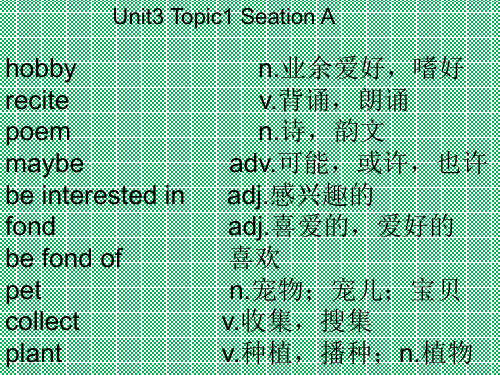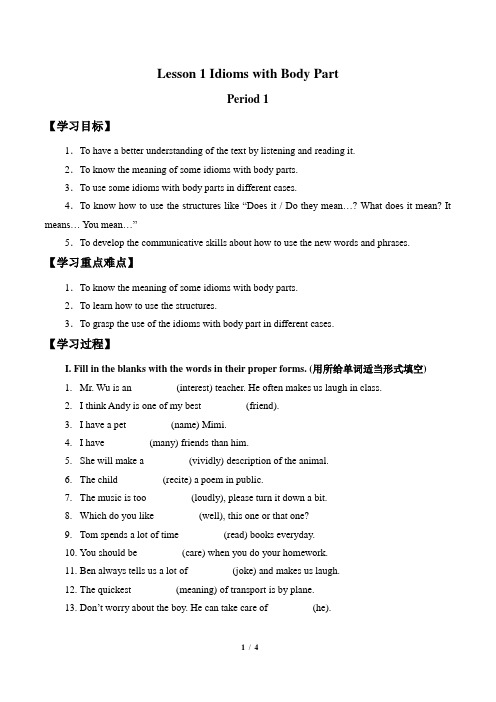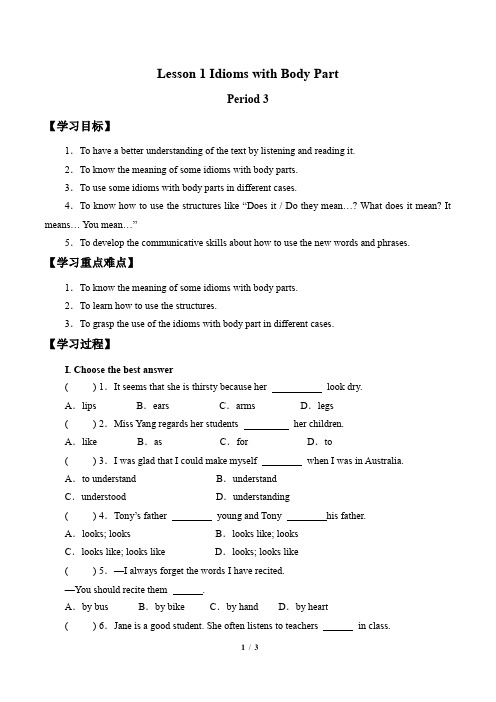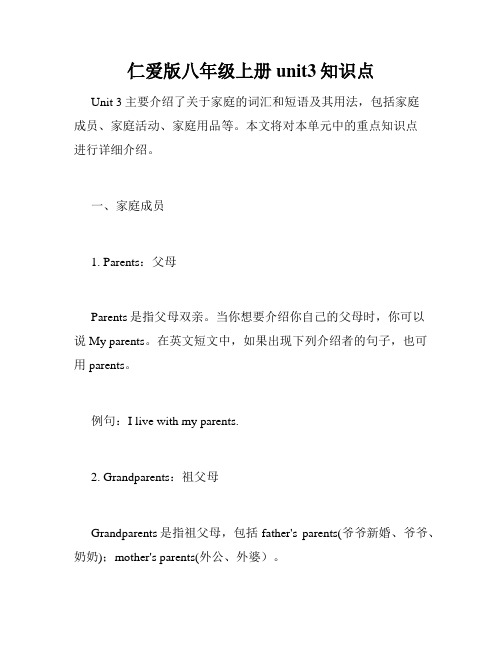八年级英语上册Unit3Lesson1IdiomswithBodyPartswords2教案牛津深圳版五四制
新世纪英语第3单元第一课Idioms with Body Parts-Tuning In(U3lesson1)

Listen to the text and answer the questions.
a. How many students took part in the discussion? b. What did they talk about?
b. 1.____ He’s all ears. 2.____You’ve got a d. sweet tooth. e. 3.____You’ve just hit the nail on the head. c. 4.____I see eye to eye with you. a. 5.____I have a green thumb.
bell/ring start the discussion about idioms with body parts. Model 1 A: What will the students do as soon as the bell rings? B:They’ll start the discussion about idioms with body parts as soon as the bell rings. Model 2 A: What did the students do as soon as the bell rang? B:They started the discussion about idioms with body parts as soon as the bell rang.
Picture3: start to surf the Internet learn a lot of idioms
1A:What____________________________ will Jane do when __________________________? she starts to surf the Internet B:_______________________________ She’ll learn a lot of idioms as soon as ________________________________. she starts to surf the Internet 2A:What____________________________ did Jane do when she started to surf the Internet ____________________________? B:________________________________ She learned a lot of idioms as soon as ______________________________. she started to surf the Internet
仁爱英语八年级上unit3topic1单词

Unit3 Topic1 Seation C
scrapbook
n.剪贴簿
friendship
n友谊,友好,友情
funny
adj.滑稽的,好笑的
ugly
v. 丑陋的,难看的
background
n.背景
paper
n.纸,纸张
பைடு நூலகம்
scissors
n.剪刀
glue
n.胶,胶水v(用胶水)粘合, 粘贴
cut
v .剪,切,割n.伤口,开口
adj.日常的,每日的 n. 蛇
v.提供,给予 n.主人,主物 n.安慰,舒服v.安慰,抚慰 n.猪,贪婪的人 n.洗澡;浴室;污秽的 n.池塘 adj.肮脏的,污秽的 adj.不友好的,有敌意的
n.宠物;宠儿;宝贝 v.收集,搜集 v.种植,播种;n.植物
Unit3 Topic1 Seation B
collection doll coin hate pop
n.收藏品,收集物 n.玩偶,玩具娃娃 n.硬币 v.厌恶,讨厌,仇恨 (=popular)adj.(口语)(音乐、艺
术等)大众的,通俗的
stick
v.粘贴,粘住
lazy
adj.懒惰的
title
n.题目,标题
passage
n.章节,段落
introduction n.介绍,引进
Unit3 Topic1 Seation D
everyday snake provide owner comfort pig bath pond dirty unfriendly
Unit3 Topic1 Seation A
hobby recite poem maybe be interested in fond be fond of pet collect plant
上海新世纪(五四学制)八年级英语第一学期:Unit 3 Lesson 1 Idioms with Body Parts 学案(无答案)

Lesson 1 Idioms with Body PartPeriod 1【学习目标】1.To have a better understanding of the text by listening and reading it.2.To know the meaning of some idioms with body parts.3.To use some idioms with body parts in different cases.4.To know how to use th e structures like “Does it / Do they mean…? What does it mean? It means… You mean…”5.To develop the communicative skills about how to use the new words and phrases.【学习重点难点】1.To know the meaning of some idioms with body parts.2.To learn how to use the structures.3.To grasp the use of the idioms with body part in different cases.【学习过程】I. Fill in the blanks with the words in their proper forms. (用所给单词适当形式填空)1.Mr. Wu is an ________ (interest) teacher. He often makes us laugh in class.2.I think Andy is one of my best ________ (friend).3.I have a pet ________ (name) Mimi.4.I have ________ (many) friends than him.5.She will make a ________ (vividly) description of the animal.6.The child ________ (recite) a poem in public.7.The music is too ________ (loudly), please turn it down a bit.8.Which do you like ________ (well), this one or that one?9.Tom spends a lot of time ________ (read) books everyday.10.You should be ________ (care) when you do your homework.11.Ben always tells us a lot of ________ (joke) and makes us laugh.12.The quickest ________ (meaning) of transport is by plane.13.Don’t worry about the boy. He can take care of ________ (he).II. Choose the best answer (选择最恰当的答案)()1.You should run the shop ________ your boss has taught you.A.as B.and C.but D.so()2.That bank clerk plays football _________ a football player.A.as good as B.as better as C.so well as D.as well as ()3.I didn’t go to bed ________ mother came back.A.after B.if C.as soon as D.until()4.He has told the story just _________ it happened.A.so B.and C.as D.for()5.I met him _______ I was spending the summer holiday.A.as B.since C.but D.and()6.I don’t know when my father _________ back, but I’ll tell you when he ________ back.A.will come; comesB.comes; willcomeC.will come;will comeD.comes; comes()7.The film had been on _________ we arrived.A.while B.when C.how D.if()8.My mother was working _________ I was doing my homework.A.when B.because C.and D.whileIII. Choose the best answer(选择最恰当的答案)()1.When they travelled in England, they found the cars and buses drive _________ the left.A.in B.on C.at D.by()2.My brother want to work ________ an astronaut when he grows up.A.in B.for C.as D.like()3.As Young Pioneers, we should give our seats to _______ old on bus.A.a B.an C.the D./()4.We must study hard and help _______ other.A.either B.each C.one D.the()5.My hometown is _______ beautiful than his.A.very much B.more much C.much more D.very more ()6.-- _______ do you go to the cinema? -- Sometimes.A.How often B.How soon C.How long D.How farIV. Put the following into English. (将下列词组译成英文)1.一……就……___________________ 2.小心一点___________________3.靠记忆___________________ 4.在……帮助下___________________5.没关系,不要紧_________________6.身势语___________________7.安静一点___________________ 8.同意某人___________________9.用……表达___________________ 10.擅长于___________________11.喜欢吃甜食___________________ 12.看法完全一致___________________13.园艺技能___________________ 14.全神贯注地听___________________15.击中要害___________________ 16.更生动地表达___________________V. Rewrite the sentences as required (按要求改写句子)1.Tell Harry the news when you see him, please. (改为否定句)_________ _________ Harry the news when you see him, please.2.Mr. Smith has taught in our school for three years.(对划线部分提问)_________ _________ has Mr. Smith taught in our school?3.He usually does some reading after supper. (改为否定句)He _________ usually _________ any reading after supper.4.It took me half an hour to go to school on foot from my home. (保持原句意思)I _________ half an hour _________ _________ school from my home.5.The new bridge will be built in three months. ( 对划线部分提问)_________ _________ will the new bridge be built?6.My young sister can hardly write or speak. (改为反义疑问句)My young sister can hardly write or speak, _________ _________?VI. Fill in the blanks with the phrases in their proper forms. (选出所给词组的适当形式填空)have got a sweet tooth see eye to eye with sb.be all earshit the nail go in one ear and out the other have a green thumb1.My answer is right, so my teacher will say _____________________.2.If you agree with Tom, what can you say? _____________________.3.We should listen to our teacher attentively. What does it mean? _____________________4.His sister is good at growing such plants as flowers and grass. We can say she _____________________.5.Her little brother likes eating a lot of chocolate. So we can say he _____________________.6.Jim never takes his parents’ advice. He always _____________________.VII. Rewrite the sentences as required (按要求改写句子)1.Alan has to finish the homework before nine o’clock. (改为一般疑问句)_________ Alan _________ to finish the homework before nine o’clock?2.Tom read an interesting story about the world under water.(改为否定句)Tom _________ _________ an interesting story about the world under water.3.Mrs. Smith could hardly remember where she had put her handbag. (改为反义疑问句)Mrs. Smith could hardly remember where she had put her handbag, _________ _________?4.Mr. and Mrs. Brown have already been to China twice. ( 对划线部分提问)_________ _________ times have Mr. and Mrs. Brown been to China?5.The playground of my school is 800 meters long. Hers is 800 meters long, too.(保持原句意思)The playground of my school is _________ long _________hers.。
上海新世纪(五四学制)八年级英语第一学期:Unit 3 Lesson 1 Idioms with Body Parts 学案(无答案)3

Lesson 1 Idioms with Body PartPeriod 3【学习目标】1.To have a better understanding of the text by listening and reading it.2.To know the meaning of some idioms with body parts.3.To use some idioms with body parts in different cases.4.To know how to use the structures like “Does it / Do they mean…? What does it mean? It means… You mean…”5.To develop the communicative skills about how to use the new words and phrases.【学习重点难点】1.To know the meaning of some idioms with body parts.2.To learn how to use the structures.3.To grasp the use of the idioms with body part in different cases.【学习过程】I. Choose the best answer( ) 1.It seems that she is thirsty because her look dry.A.lips B.ears C.arms D.legs( ) 2.Miss Yang regards her students her children.A.like B.as C.for D.to( ) 3.I was glad that I could make myself when I was in Australia.A.to understand B.understandC.understood D.understanding( ) 4.Tony’s father young and Tony his father.A.looks; looks B.looks like; looksC.looks like; looks like D.looks; looks like( ) 5.—I always forget the words I have recited.—You should recite them .A.by bus B.by bike C.by hand D.by heart( ) 6.Jane is a good student. She often listens to teachers in class.A.attentively B.vividly C.loudly D.quickly( ) 7.—You look sad.Why?—Oh, it’s hard to my sadness. A.write B.introduce C.express D.recite( ) 8.—What can I do for you?—This skirt looks nice. Can I it ?A.try; on B.turn; down C.put; away D.look; for( ) 9.She us the truth as soon as she it.A.will tell; knew B.told; will knowC.tells; will know D.will tell; knows( ) 10.—I’m sorry. I’ve broken your cup. — .A.I’m sorry to hear that B.Never mindC.Good job D.This way, pleaseII. Complete the sentences with the given words in their proper forms. 1.Michael sees a foreigner (put) out his hand with his thumb raised.2.You can (buy) a guide book when you are travelling.3.I (go) to Shanghai next week.4.I’m just (kid).5.They are fond of (excite) activities.6.As soon as Jane got to Australia, she (call) her parents.III Rewrite the sentences as required.1.Lucy is listening to Mr. Lee attentively. (改为同义句)Lucy is .2.I mean that I see eye to eye with you. (对画线部分提问)do you mean?3.你一到上海就给我打个电话好吗?(汉译英)Will you please call me as soon as you Shanghai?4.请尽快完成作业。
仁爱版八年级英语上册Unit3Topic1知识汇总

仁爱版八年级英语上册Unit 3 Topic 1 知识汇总Unit 3 Topic 1 单词hobby /?h?bi/n. 业余爱好,嗜好recite /r??sa?t/v. 背诵,朗诵poem /?p???m/n. 诗,韵文maybe /'me?bi/adv. 可能,或许,也许be interested in 感兴趣的fond /f?nd/adj. 喜爱的,爱好的be /bi?/fond of 喜欢pet /pet/n. 宠物;宠儿;宝贝collect /k?'lekt/v. 收集,搜集plant /plɑ?nt/v. 种植,播种;n.植物collection /k??lek?(?)n/n. 收藏品,收集物doll /d?l/n. 玩偶,玩具娃娃coin /k??n/n. 硬币hate /he?t/v. 厌恶,讨厌,仇恨pop /p?p/(=popular)adj. (口语)(音乐、艺术等)大众的,通俗的scrapbook 剪贴簿friendship /'frend??p/n 友谊,友好,友情funny /'f?ni/adj. 滑稽的,好笑的stupid 愚蠢的;笨的ugly /??ɡli/v. 丑陋的,难看的background /?b?kɡra?nd/n. 背景paper /'pe?p?/n. 纸,纸张scissors/'s?z?z/n.剪刀glue /ɡlu?/n. 胶,胶水v(用胶水)粘合,粘贴cut /k?t/v. 剪,切,割n.伤口,开口stick /st?k/v. 粘贴,粘住lazy /'le?zi/adj. 懒惰的title /?t??u???t?sju?/n. 题目,标题passage /?p?s?d?/n. 章节,段落introduction /?ntr??d?k?(?)n/n. 介绍,引进everyday /?evr?b?di/adj. 日常的,每日的snake /sne?k/n. 蛇provide /pr?'va?d/v. 提供,给予owner /'??n?/n. 主人,主物comfort /?k?mf?t/n. 安慰,舒服v.安慰,抚慰pig /p?g/n. 猪,贪婪的人bath /bɑ?θ/n. 洗澡;浴室;污秽的pond /p?nd/n. 池塘dirty /'d??ti/adj. 肮脏的,污秽的unfriendly /'?n'frendli/adj. 不友好的有敌意的Unit 3 Topic 1 知识梳理Topic1 What’s your hobby? 【重点短语】1.in one’s free/spare time 在某人空闲时间2.go fishing 钓鱼3.do some outdoor activities 做一些户外活动4.why not +v.=why don’t you + v.5.enjoy/like/love doing sth. 喜欢做某事be interested in doing 对做某事感兴趣be fond of doing sth. 喜欢做某事prefer doing sth. 更喜欢做某事6.stamp collection 邮票收集7.learn…from…从……中学习ed to do sth. 过去常常做某事be/get used to (doing0 sth. 习惯于做某事9.get started 着手,开始10.start/begin with…以……开始11.cut out 剪下12.stick…to…把……粘贴到……上13.share sth. with sb. 与某人分享某物14.finish school 毕业15.provide sb. with sth.= provide sth. for sb.为某人提供某物16.take/have a bath 洗澡17.whether…or not…是否18.recite poems 背诗【重点句型】1.What do you often do in your free time?你空闲时间经常做什么?2.--Why not go out and do some outdoor activities? --Sound good! Maybe I need a change.--为什么不出去做一些户外活动呢?--听起来不错,也许我需要改变。
外研版八年级英语上册Module3 Unit1 说课稿

外研版八年级英语上册Module3 Unit1 说课稿Module 3 SportsUnit1 Nothing is more enjoyable than playing tennis.Good morning, I am Cheng Shuhui from Hefei Xing Zhi School. It’s my great honor to be here sharing my teaching ideas with all of you. The content of my lesson is Module 3 sports Unit1 Nothing is more enjoyable than playing tennis taken from New Standard English textbook for eighth-graders by Foreign Language Teaching and Research Press. The following five parts will be covered in my presentation: the guiding theory, general introduction, analysis of teaching procedures, homework & blackboard design, and features of my design.Part 1 Guiding TheoryThe lesson is designed under the guidance of Core Competence of English Subject, the View of English Learning Activities, and Bloom's Taxonomy of Learning.Part 2 General Introduction(there are basically 6 aspects)I. Analysis of Teaching Material & Target StudentsFirst of all, I analyze the unit from three dimensions: What, How and Why.What:Theme: Humans & societyContent: The type of this lesson is listening and speaking. The topic of the dialog is about sports.How:Structure: The dialog is arranged in the logical order. The passage consists of several turns of talking on sports and other things they like and the reason why they like them.The target language: The Comparative Degree.Why:Intention & The thematic meaning: To arouse students’ awareness of the importance of keeping doing sports.Next, I am going to talk about my students.The target students are English learners in Grade eight. They are active, imaginative and more cognitive. From the perspectives of their background knowledge, present difficulty and breakthrough methods, I adopt SWOT model to analyze the learners.II. Teaching ObjectivesBased on analysis of the teaching material and target students, the objectives can be designed as follows:At the end of the class, students will be able to:a) Identify and cognize the topic-related vocabulary;b) Summarize and integrate the information about sports and perceive the Comparative Degree;c) Notice the rule of the Comparative Degree and talk about one’s favorite sports and give reasons using the Comparative Degree in the practical scene.d) Use proper strategies like prediction or note-taking while doing listening activities.e) Create a new dialog between a reporter and students on the sports they like and the reason why they like it.f) Debate and express their own opinions on different sports they like.g) Form correct values knowing that sports is the source of all life. The importance of doing sports can be highlighted within all kinds of activities.(the four elements of core competence permeate mutually in the objectives)III . Key points and difficult pointsAccording to the objectives above, the key points are:a) to define and cognize the key vocabulary;b) to comprehend the dialog by strategies;The difficult points are:a) to talk about one’s favorite sports and give reasons using the Comparative Degree in the practical scene.b) to understand the structure and the way of developing a conversation and then create an imitative dialogIV. Teaching methodsTo achieve the objectives, stress the important points and break through the difficult points, I use PWP Approach, Activity-based Approach, and Communicative Approach..V.Teaching aidsI use the projector, the blackboard and the learning sheets.VI. EvaluationI adopt Teacher’s evaluation, self- evaluation and peer evaluation to inspire most students and evaluate students fairly from all-around perspectives.Part 3 Teaching procedures:Now I would like to introduce my teaching procedures in detail which consists of mainly three aspects: pre-listening, while-listening and post-listening activities.1. Pre-listening activitiesStep 1 Warming-upI will show students a video clip which is taken from the recording of World Cup Final 2018.(Present a short video and pose a question: what is it about? )Purpose of my design: students are familiar with football and have a desire to express, which can arouse students’ interest, lead in the topic, and transfer towards the textbook.Step 2 BrainstormingEncourage them to list out other sports they know.Purpose of my design: To activate students’ background knowledge and build a sense of achievement at the very beginning in order to remove word barriers, activate information gap and stimulate students’ activeness in listening.2. While-listening ActivitiesAnd next let’s move on to the while-listening part, which includes three steps.Step 1 Listen for preparationStudents are guided to do a matching and gap filling activity after listening to a conversation about different kinds of sports. Some listening skills will be introduced before doing the activity.Purpose of my design: in this way, students can develop the predictive skill and move the word barrier for conversation which contains several turns of talking about sports. It will somehow low down students’ anxiety of learning.Step2 Listen for specific informationAfter getting ready, it’s time to get more details.Firstly, ask students to get detailed information while listening to the conversation for the first time to answer some wh-questions about sports in it.Purpose of my design: enable students to have an overview of the conversation and got familiar with the framework of this dialog.Then ask students to listen to the conversation for the second time to check true statements.Purpose of my design: enable students to have a deep understand of spoken language. Meanwhile, some listeningstrategies will be introduced to help them get a better understanding of their opinions towards different sports.After that, students will be guided to focus on the key information of comparison of different sports. Highlightthe Comparative Degree in different comparisons. The framework of the topic will be extracted as well.Purpose of my design: enable students to have anoverview of the conversation and get familiar with the framework of this dialog.Steps 3 Listen for languageAlso, some questions will be presented to help students analyze the language from the perspective of sociallinguistic level. Encourage them to find out how dospeakers express themselves well with different utterances.Purpose of my design: enable students to get more information about language focus in the conversation.Then, they will read to summarize different comparisons with different forms of comparative adjectives, especially, those with mutisyllable adjectives.Purpose of my design: the most difficult language point will be visualized in a deductive way. The usage of theComparative Degree will be concluded with sentences on the screen in order to prepare for the language output.3. Post-listening ActivitiesStep1 Role-play the dialog.Now that student will role-play the dialog.Step2 DebatingAfter series of interpretations, students now have already known how to express themselves with the Comparative Degree on sports they like. They will work in groups to defend themselves on which sports is better for students.Purpose of my design: on the one hand, students are expected to apply what they learned immediately into practice and expand thinking (their critical thinking and dialectical thinking are cultivated here), on the other hand, the discussion can lower the difficulty for writing and get students prepared efficiently.Step3 WritingCreate a real situation: In the new term we’re going to have new sports clubs (such as the football club, the baseball club, the volleyball clu b…).Which sport club do you want to join? Give your reasons!Purpose of my design: encourage students to output the target language in a real scenario. The topic can be learned or created. They can discuss and cooperate while writing.Step4 Discussion and summaryFinally, ask students about the motto of the Olympic Games. Lead them to be aware of the importance of sports.Step 5 HomeworkOptional: Make a poster about sports you like.Compulsory: Work in groups to make the interview more logical.Step 6 Blackboard designPurpose of my design: 1.Show the content and topic of the discourse. 2. Highlight the key information of the discourse.Part4 Features of DesignFor the last part, let’s come to the features of design.1.Learner-centered teachingStudents are indicated to finish diverse tasks individually or cooperatively. Students are the real masters of the class while the teacher myself is the director, organizer, evaluator and promoter. I just facilitate students to achieve the objectives step by step.2.Interpret the text from multiple perspectivesI focus on not only language, information and function but also the structure, meaning and logic in the process.In my instructional design, all the teaching steps are served to one or several certain objectives which point to the students’ key competences directly. All the tasks and activities are well selected in order to encourage students to have an interactive communication with the discourse.3.Mind participating(thinking quality enhancement)While we are listening, parts of our body participate actively, especially, our mind. All tasks I set are for different layers of thinking qualities. From the remembering of facts to the understanding of sentences, from analysis of structure to a creating outcome, students are engaged into different mind-developing tasks.That’s all for my presentation of teaching. Thank you for listening.。
仁爱版八年级上册unit3知识点

仁爱版八年级上册unit3知识点Unit 3主要介绍了关于家庭的词汇和短语及其用法,包括家庭成员、家庭活动、家庭用品等。
本文将对本单元中的重点知识点进行详细介绍。
一、家庭成员1. Parents:父母Parents是指父母双亲。
当你想要介绍你自己的父母时,你可以说My parents。
在英文短文中,如果出现下列介绍者的句子,也可用parents。
例句:I live with my parents.2. Grandparents:祖父母Grandparents是指祖父母,包括father's parents(爷爷新婚、爷爷、奶奶);mother's parents(外公、外婆)。
例句:I often visit my grandparents.3. Uncle:叔叔/伯伯Uncle可以指叔叔或者伯伯。
在英文中没有明显的区分,只有伯伯(父亲兄弟)、叔叔(父亲弟弟)。
例句:My uncle lives in Canada.4. Aunt:阿姨/伯母Aunt是指阿姨或者伯母,和Uncle一样,并没有明显的区分。
需要根据实际情况进行判断。
例句:My aunt is a teacher.二、家庭活动1. Have a picnic:去野餐Have a picnic是指去外面野餐。
这是一个很好的家庭活动,你可以和家人一起享受阳光和大自然。
例句:We are going to have a picnic this weekend.2. Play board games:玩桌游在家里玩桌游也是一个很好的家庭活动。
这可以增加家庭成员之间的互动,并且在享受游戏的同时,还可以提高智力。
例句:We often play board games on Saturday nights.3. Watch TV:看电视在家里看电视是很多家庭成员都喜欢的活动。
不过需要注意的是,如果看电视时间过长,会影响家庭成员之间的交流。
八年级上册英语u1t3sa知识点

八年级上册英语u1t3sa知识点本文主要介绍了八年级上册英语Unit 1 Topic 3的知识点,帮助同学们更好的掌握该部分内容。
1. 介绍身份和家庭成员的表达在英语中,我们常常需要用到介绍自己身份或者家庭成员的表达方式。
例如:- My name is Jack. 我的名字是杰克。
- I have a sister and a brother. 我有一个姐姐和一个弟弟。
介绍家庭成员时,我们还常常需要使用 possessive pronoun (所有格代词)来表达家庭成员之间的关系,例如:- This is my mother's car. 这是我母亲的车。
- Your brother's room is next to mine. 你弟弟的房间在我旁边。
2. 表达喜好和不喜好在英语中,我们需要用到很多关于喜好和不喜好的词汇,例如:- like 喜欢- love 热爱- prefer 更喜欢- hate 讨厌- dislike 不喜欢我们还可以使用这些词汇进行句子的复合,以表达更多的意思,例如:- I love playing basketball, but I hate running. 我喜欢打篮球,但我讨厌跑步。
- She dislikes eating vegetables, but she loves eating fruits. 她不喜欢吃蔬菜,但她喜欢吃水果。
3. 常用疑问句的用法在英语中,疑问句的用法非常常见。
我们常常需要用疑问句来询问一些信息或者情况。
例如:- What's your name? 你叫什么名字?- Where do you live? 你住在哪里?- How old are you? 你多少岁了?在使用疑问句的时候,需要注意一些语法规则。
例如,在疑问句中,需要使用动词的助动词来构成问句,如 do、does、did 等。
例如:- Does she like playing tennis? 她喜欢打网球吗?- Did you go to school yesterday? 昨天你去学校了吗?4. 介绍日常活动的表达在日常生活中,我们经常需要用到一些表达来描述我们的日常活动。
- 1、下载文档前请自行甄别文档内容的完整性,平台不提供额外的编辑、内容补充、找答案等附加服务。
- 2、"仅部分预览"的文档,不可在线预览部分如存在完整性等问题,可反馈申请退款(可完整预览的文档不适用该条件!)。
- 3、如文档侵犯您的权益,请联系客服反馈,我们会尽快为您处理(人工客服工作时间:9:00-18:30)。
Teaching procedures: Ⅰ.Pre-task: Review the idioms with body parts: 1)be all ears=listen attentively 2)have got a sweet tooth 3)hit the nail on the head 4)see eye to eye with sb=agree with sb=have the same opinion with sb 5)have a green thumb=be good at gardening g. 6)He’s pulling your leg.=He’s kidding. 7)I’m all thumbs.=I’m clumsy
Ⅱ.Progress and Methods: 1. Students will be able to develop their abilities of learning independently, cooperation with others and sharing with others. 2. Students will be able to learn how to use the knowledge into practice. 3. Students will be able to develop their abilities of listening, speaking and reading. Ⅲ.Emotions and values: 1. Students will be able to arouse the interest of learning English. 2. Students will be able to develop the communicative skills about how to use the new words and phrases. Language focus and difficult points: To grasp the use of the meaning of the new words and expressions.
Unit 3 Lesson 1 Idioms with Body Parts words2
教学目标: Teaching objectives: Ⅰ. Knowledge and skills: 1. 2. 3. Students will be able to master some sentence pattern. Students will be able to talk about idioms with body parts. Students will be able to master the pronunciation and use of the new words
5.attentively ad. 注意地,聚精会神地→attention n.注意
listen attentively 聚精会神地听 pay attention to 注意…. 7.mean (meant-meant)v.→meaning n. 意思, 含义 It means that + 从句 Does it mean that…..? Yes, it does. / No, it doesn’t.
What does it mean?它是什么意思? What do you mean by doing sth?你这么做是什么意思? What do you mean by 小气,吝啬的 Ⅲ.Post-task: Homework: 1. Read the words and sentences by heart . 2. Preview the new words part 2 a mean man
ⅡNew words and expressions. 3.body n. 身体,躯体,尸体 body language 肢体语言
e.g.People speak different languages, but they use a common body language ,sometimes. 4.part n. 部分 body part 人体部分
